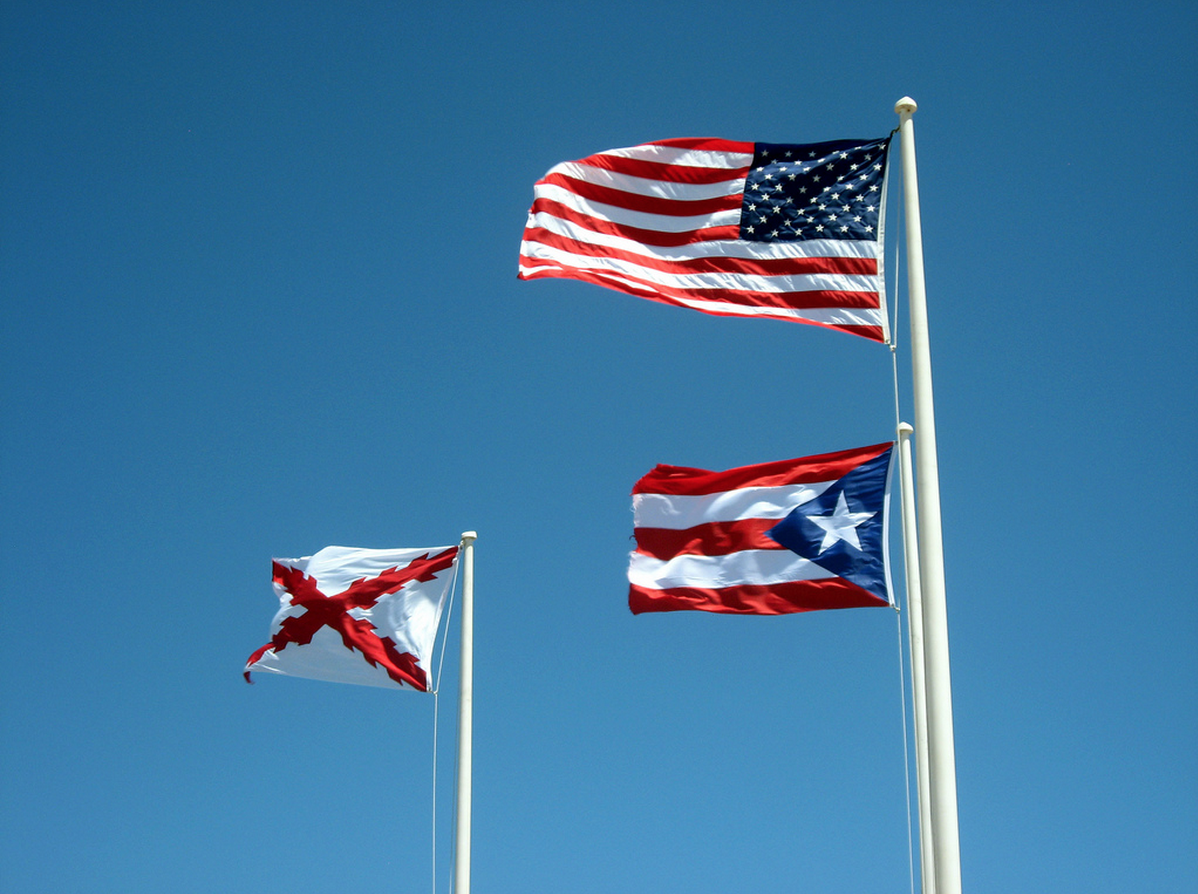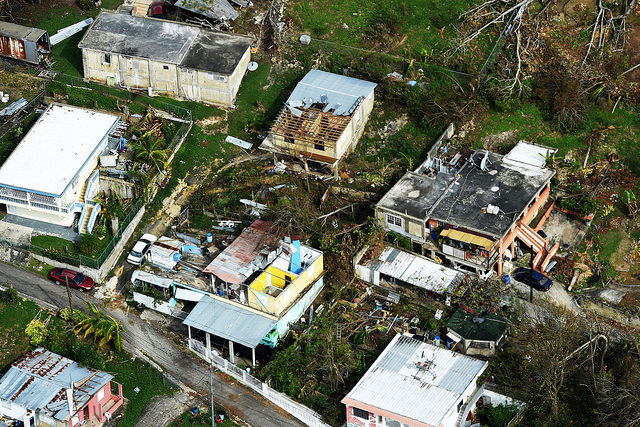Puerto Rico: The Forgotten Territory
 U.S. flag, Puerto Rican Flag, and Burgundy Cross, representing Spanish influence
U.S. flag, Puerto Rican Flag, and Burgundy Cross, representing Spanish influence
Tragedies should never go unnoticed, particularly not if the tragedy is of the magnitude which Puerto Rico faced three weeks ago. Only two weeks after being struck by Hurricane Irma, the densely populated US territory was struck by Hurricane Maria. At the time of the second strike at least 6,000 Puerto Ricans were without power and many more were scrambling to piece their lives back together. As a result Maria left thousands more without food, power, or clean water, and the situation in the country is turning into a humanitarian crisis. Yet the response from the United States’ collective conscious and government has been sluggish and insufficient at best.
Puerto Rico is already in the midsts of a humanitarian crisis which could get significantly worse without proper attention. Official government releases say that 45 people have died as a result of the hurricanes, but that number is thought to be a low estimate due to the inability to reach certain places and the destruction of communication infrastructure across the island. 90% of Puerto Ricans are currently without power and 35% are without water to drink or bathe in, and approximately two million people are in need of food. These needs are not nearly being met by the US government. FEMA (Federal Emergency Management Agency) revealed that they were giving out only 200,000 meals per day to a population of two million which simply is not enough resources to properly address the crisis. The United States Environmental Protection Agency (EPA) recently released a report that many Puerto Ricans are trying to access wells that have been sealed off due to the presence of toxic water, further proof that whatever action has been taken is not sufficient to meet the needs of hundreds of thousands of Puerto Ricans.
Despite such a crisis, it appears that the White House has been slow to act in regards to providing support for the island. Three weeks after the disaster Donald Trump has finally asked for a $5 billion loan from Congress to give to Puerto Rico so that the territory can avoid a liquidity crisis, but has yet to grant them the same disaster aid which has been extended to Texas and Florida after the hurricanes they faced. Similarly, the disasters in Texas and Florida were granted a combined 16,000 service members to help with disaster relief. For Maria, however, only 4,500 troops have been offered when some experts estimate 50,000 troops are required.
Why the disparity? Puerto Rico is a territory of the United States and houses 3.4 million US citizens who are just as entitled to the same aid given to the victims of Hurricanes Harvey and Irma. So why haven’t they been given the same sufficient help which was offered to Texas and Florida?

Trump has hinted at a number of reasons why the US is unwilling to offer help to Puerto Rico. His explanations have ranged from the trivial, such as the fact that Puerto Rico is separated by water, to the more malicious: victim blaming assertions that Puerto Rico’s poor management of the economy ultimately lead them to their present state.
Nonetheless, while Puerto Rico is not completely to blame for the current crisis, Trump is not incorrect in highlighting their struggling economy. Puerto Rico declared bankruptcy in May, and has a dire economic situation. The country’s average income is about $18,000 a year, half of Mississippi’s, the poorest state in the US, while the cost of living is about 13% higher than the national average in the US. However, this economic turmoil has primarily been the product of post-colonial US trade policy with the country. The Jones Act, which was written and passed in 1920, gives US made and manned ships a complete monopoly over all shipments made between the US and its territories. This makes goods unnecessarily expensive for Puerto Ricans and gives them very little trade leverage, which is crucial for developing nations who have had a history of colonial upheaval like Puerto Rico. The Jones Act was temporarily lifted for the disaster, but in a perverse series of events, the act was reinstated while the crisis continues to affect millions.
Regardless of economic inefficiencies in the Puerto Rican economy, the US’s response to the crisis has lacked the same empathy granted to the victims of the hurricanes in Houston and Florida. Trump’s tweets about Harvey in comparison to the tweets about Puerto Rico are just a microcosm of the collective national reaction. FiveThirtyEight recently released a graphic showing how Puerto Rico’s disaster was virtually ignored by American media outlets in comparison to the Houston and Florida disasters.
The truth is that the US, from its president to the “mainstream media”, who are so at odds with each other, fails to see Puerto Ricans as they see the mainland victims of Hurricane Harvey or Irma. They do not see them as Americans. The narrative from people in power has been filled with classist and racist undertones and overtones, whether it be the ability of cable news to ignore the suffering of desperately poor people of colour or the president’s tweets. Trump claimed in a tweet that Puerto Rico wanted “everything done for them”, somehow managing to both invoke racist stereotypes and create the idea that hurricane victims are entitled people.
Trump’s reaction to Puerto Rico is not surprising. He has merely lived up to the bottom of the barrel standards that have been set before him. However, this does not excuse him, nor should it. This past year has been an intensive desensitization to the moral corruption of the American government – but a line must be drawn somewhere. People have died and the numbers will only increase if this collective apathy continues. People under American jurisdiction, whose representatives go to Washington D.C. everyday, who pay taxes just the same as those in Ohio, and who are granted the same rights as any other American citizen, are being killed by negligence.
No one is to blame when a natural disaster hits. There is no terrorist group to go after, no way to take vengeance; there is only recovery. Trump has only been able to point the finger thus far. Given the fact that Maria was a storm aggravated by climate change primarily perpetuated by the first world, and further ruined an economy already ravaged by colonial and neo-colonial exploitation, it is time that we take some of that responsibility.
Alfie Crooks is from London, England, studying political science at McGill University. He reads and sometimes writes about US and European politics, among other things.
Edited by: Thea Koper
